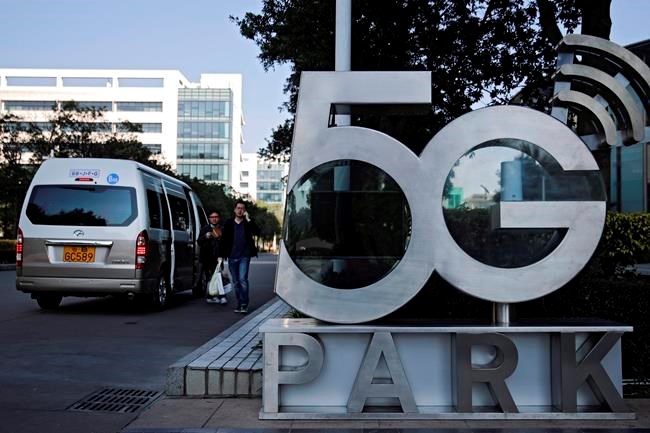OTTAWA — A top Trump administration adviser on telecommunications met Monday with officials in Ottawa as Canada continues working on whether to allow Chinese firm Huawei to participate in its new 5G wireless internet network.
The U.S. Embassy in Ottawa and a spokeswoman for Deputy Prime Minister Chrystia Freeland confirmed the meetings with Robert Blair, the White House special representative for international telecommunications. But neither Freeland's office nor Public Safety, the department in charge of the 5G decision, would give details about who from Canada took part in the talks.
President Donald Trump has warned American allies, especially those in the Five Eyes intelligence sharing network that includes Canada, Britain, Australia and New Zealand, not to allow Huawei into their next-generation 5G networks.
The U.S. deems the Chinese tech giant a national-security threat, a charge the company denies.
The Conservatives accused the Liberal government on Monday of being indecisive.
"Just today, the U.S. sent a top official to plead with the Liberals to ban Huawei. However, instead of working together with our most important ally, senior Liberals called them bullies," Conservative MP Rob Morrison charged in Question Period, without providing further details.
Public Safety Minister Bill Blair told the House of Commons that he had met with "United States officials" on Monday but he rejected Morrison's characterization about Canada being bullied by its southern neighbour.
"In fact, there is a very robust and important discussion going on between ourselves and our allies to ensure that the decision we make in Canada's best interest takes into full account all the scientific and security factors that must be considered to ensure that we do what is right to maintain a safe and secure environment for Canadians and that we keep them safe," the minister replied.
Rather than answer questions about whom Robert Blair saw in Ottawa and what they discussed, Bill Blair's office said a decision on 5G and Huawei is coming and the government is "taking all security factors into account," including the views of Canada's allies.
The U.S. Embassy said in a statement that Robert Blair met with officials from Public Safety; National Defence; the Communications Security Establishment; the Canadian Security Intelligence Service; and the Department of Innovation, Science, and Industry; as well as opposition party leaders.
"In his meetings, Mr. Blair discussed the importance of a secure and reliable next-generation telecommunications infrastructure that will support and sustain economic prosperity, data privacy, interoperable energy infrastructure, and the defence partnership between the United States and Canada," the statement said.
A former Canadian ambassador to China, Guy Saint-Jacques, said Huawei's operations in Canada could be subjected to more oversight if the company agreed to become a publicly traded entity in this country.
"That would create more transparency with Canadians on the board and then after that continue to monitor it closely," Saint-Jacques said in testimony at the special Commons committee on China-Canada relations. If Huawei's Canadian arm agreed to be publicly traded, it would have to allow Canadians on its board of directors, he said.
The Trump administration has said that China's 2017 national intelligence law means communist leaders could force Huawei to conduct cyberespionage on behalf of the country's government.
"5G" is the term for the next generation of wireless data technology, allowing much faster transmission of digital information with shorter delays. Besides moving more data to and from smartphones, 5G is expected to transform technology such as in health care, autonomous vehicles, and remote sensing.
In January, Britain granted Huawei partial access to its next-generation 5G network, but it still considers the Chinese telecom company a security risk that requires special attention.
British officials have said there are not enough companies to serve the country's 5G needs, so the government opted to limit Huawei's participation to 35 per cent of its less sensitive parts.
The Trudeau government has said it is studying the British decision but has given no indication about whether its own long-awaited decision is coming any time soon. The decision is complicated by China's ongoing imprisonment of two Canadians, Michael Kovrig and Michael Spavor, who were detained on spying allegations more than a year ago.
Spavor and Kovrig were detained after Canada arrested Huawei executive Meng Wanzhou on a U.S. extradition warrant, enraging Beijing's communist leaders, who have loudly called for Meng to be released.
Saint-Jacques, who was the Canadian ambassador to China from 2012 to 2016, said Kovrig and Spavor could face a trial any day.
"And if so, it will take 18 to 24 months before they are sentenced. Once the process starts it will become a lot more difficult to get them out," he told the committee.
Meng's extradition case in Canada could "drag on for years" unless a judge tosses out the extradition request later this year, he noted.
"We have to brace ourselves for years of difficult relations."
This report by The Canadian Press was first published March 9, 2020.
Mike Blanchfield, The Canadian Press



